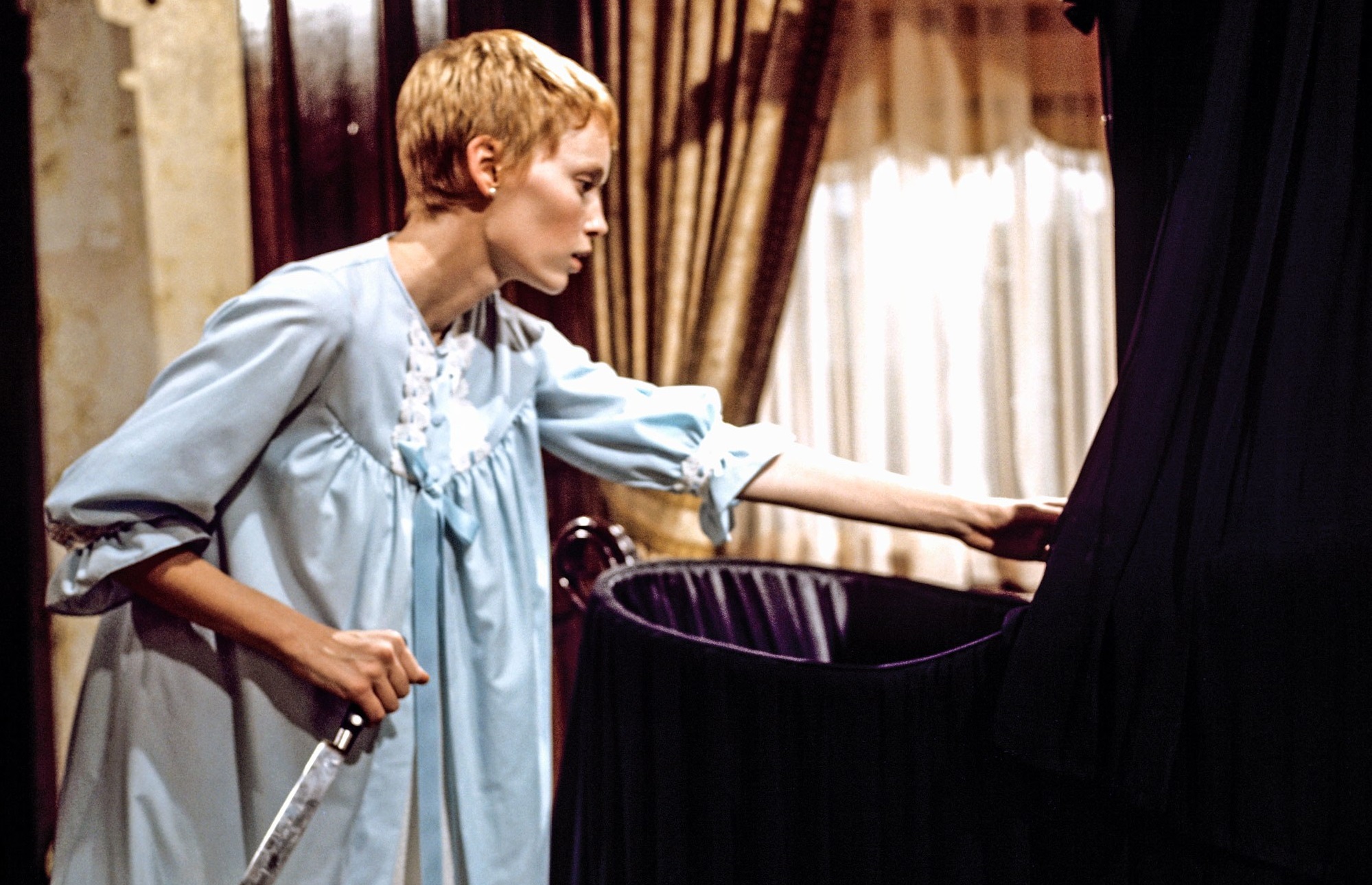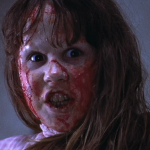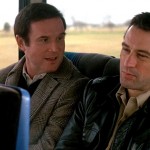
Sometimes we're dumb and haven't seen movies that everyone universally loves. Better Late Than Never is where we make amends by playing catch-up and writing about the experience.
The movie: Rosemary's Baby (d. Roman Polanski, 1968)
The story: A young woman in 1965 New York City (Mia Farrow) starts to suspect that her neighbors are a coven of witches who want her unborn baby for nefarious purposes. Everyone, including her husband, proceeds to gaslight the shit out of her.
Why I've never gotten around to watching it: Maybe because I always had it pegged as the "arty" religious-horror classic, and trust me when I tell you that 15-year-old me was not into arty. Fifteen-year-old me wanted spinning heads and priests being impaled on lightning rods. So while I watched The Exorcist and The Omen more times than I could possibly count as a teen, I never got around to Rosemary's Baby. Later in life, my wife and I had a couple of babies of our own. So obviously those years were out. Also, there's the whole Roman Polanski issue. I'm usually pretty diligent about separating art from artist, but it's fair to say I've always had plenty of other films on my list of shame that weren't made by problematic directors. You can't blame me for wanting to cross those out first.
So, now that I've finally seen it, what did I think? Teenaged me would have definitely found it too arty. (And possibly too prissy. There's an opening credit that reads "Miss Farrow's hairstyles created by …") Adult me realizes that while Rosemary's Baby likely inspired many of the over-the-top, Satanic-themed horror films of the 1970s, Polanski's more grounded film is primarily interested in exploring the mindset of an under-duress pregnant woman suffering from terrible anxiety. A few small exceptions aside (which we'll talk about later), it's straight psychological horror for most of its two-hour-and-sixteen-minute run time that's heavy on metaphor and sociological commentary.
None of this is a bad thing, of course, as the best horror movies are usually rooted in real-world anxieties. Rosemary's Baby tackles a whole host of them: pregnancy, impending parenthood, a failing marriage, intrusive neighbors. And, over the years, the very era the film takes place in — one in which the women's lib movement was just starting to rev up — has likely led to the re-contextualization of the unfortunate situation Rosemary finds herself in. She spends most of the movie trapped in a lavish, big city apartment, unable to break free from the maternal role that has been designated for her. There's no doubting how progressive it must have felt to see these themes dropped into a plot about the birth of the Antichrist and then presented in a sleek Hollywood release. The horror genre may not have exploded in the 1970s the way it did if not for Rosemary's Baby. One can assume it emboldened high-minded filmmakers the same way Night of the Living Dead, which was released the same year, ignited the fires of hundreds of grindhouse auteurs. (Which makes it kind of ironic that Rosemary's Baby was produced by William Castle, the gimmick-loving, B-movie producer who picked up the rights to the novel the film is based on in a bid to go legit.)
All that said, after having finally seen the movie, I'm not convinced it all works nearly as well as an all-time classic should. For starters, there are elements of the film that feel under-cooked and ultimately hinder the story's overall potential. The failing marriage I mentioned? The movie tells us that Rosemary and her husband, Guy (John Cassavetes), are having domestic difficulties more than it actually shows us. In fact, the first time she complains about him not paying attention to her, I was caught off guard. "Wait, he wasn't? When did that happen?!" Lip service is paid to Guy's rising status as a New York actor, but for as big a plot point as it ends up being, it barely registers in the movie. Polanski could have mined so much more emotional depth by more explicitly detailing the growing dysfunction between a man too invested in his own fame and his increasingly paranoid but still far-too-demure wife. Heck, even the revelation that Guy raped Rosemary after she passed out one night — or at least his claim that he did — barely warrants a reaction from her. (Part of this could partially be ascribed to Rosemary passively accepting her role as a 1960s housewife, but it doesn't lead to much in the way of domestic drama.)
Even more disappointing is just how silly the movie gets in the few instances it does dip its toes into more visceral horror. The film's one big stand-out horror scene is a dream-like sequence where a drugged Rosemary is stripped bare, her body painted for an occult ritual, and raped by a very literal Satan. I could see the surreal sequence inspiring a young David Lynch, but the way it's shot and edited robs it of making the kind of impact that's still going to be felt 50 years and a bazillion horror movies later. The makeup is not great. There's obviously a body double for Farrow which leads to some awkward edits. It's not lit in a particularly threatening manner. And Farrow screaming out "This is not a dream! This is really happening!" is so on-the-nose to almost be farcical.
Polanski has a chance to fix that mistake in the film's final scene where everybody's cards get laid on the table, and Rosemary enters a coven party, knife in hand, to find out just what's happened to her baby. I don't blame Polanski for (mostly) not showing the baby. Farrow's performance — which is quite good throughout the film — conveys the horror of what she sees far better than any late-60s-era makeup and FX likely could have. But I can hold him accountable for the sheer corniness of the party at large. After two-plus hours of focusing on the mindset of one troubled young woman, that final scene was the time to reveal that the grand darkness Rosemary has conjured up in her mind was not a delusion but instead a very literal evil. Instead, we get a bunch of cartoonish old people hanging out like it's bridge night, proclaiming "Hail Satan!" and "God is dead!" at the lamest Satanic soirée ever. I'd argue a change of tone is needed here to jolt the audience, but Polanski stages it in far too mundane, straight-forward of a manner.
None of this gets in the way of Rosemary's Baby being a good movie, and I get why its legacy still looms large over the genre. But the botching of the few honest horror elements in play does prevent me from fully capitulating to its sterling reputation. Maybe the ghost of 15-year-old me is still kicking around in my brain somewhere, making sure he has his say.











